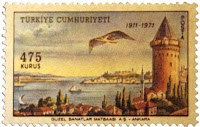Yeah, it was
a satisfactory one. I don’t mean my homework. I mean Holes by Sachar, instead. It is our
teacher’s (how are you Mr. Siever?) assignment to decide how well is my homework.
I have done my best, despite being in Antalya for a math training camp. Actually
Holes has more than satisfactory, if one considers the style of writing,
structure and main message of the book. (It is my real opinion; I don’t want to
praise the book only for oral mark.)
Author uses mostly all possibilities of literature to enhance the expression, from the beginning to
the end. For instance, irony
plays a great role throughout Holes.
"Welcome to
Camp Green Lake," said the driver. Stanley looked out the dirty window. He
couldn't see a lake. And hardly anything was green. (3th chapter)
On the other hand, Sachar wonders readers by wondering
our main character Stanley.
The last thing
he(Stanley) wanted to do after killing himself all day on the lake was to get in a fight
with a boy called the Caveman. He was glad X-Ray and Armpit had come to his
rescue. (…) Stanley looked around to see that Armpit and Squid were talking to
him. (…) The Lump wasn't the Caveman. He was. (9th chapter)
He connects past with
present to build a plenty of coincidence and fill the holes.
“I want you to do
one more thing for me."(Madame Zeroni) "Anything," said Elya. "I
want you to carry me up the mountain. I want to drink from the stream, and I
want you to sing the song to me." (7th chapter)
The great-great-grandson of Elya
Yelnats carried the great-great-great-grandson of Madame Zeroni up the mountain. (50th
chapter)
Author uses
some funny words and phrases which make characterizations stronger. These were one of most enjoyable parts for me.
It
was all because of his(Stanley’s)
no-good-dirty-rotten-pig-stealing-great-great-grandfather! (3rd chapter)
(…)"Stanley Yelnats" was spelled the same
frontward and backward. So they kept naming their sons Stanley. (3rd chapter)
"My name is easy to remember," said Mr.
Pendanski as he shook hands with Stanley just outside the tent. "Three
easy words: pen, dance, key." (5th chapter)
And at
the final scene, Louis Sachar completes the song. By this way, he describes how destiny of Stanley's family concludes. The predominant message of
the book is clear for reader:
If only, if
only, the moon speaks no reply;
Reflecting the sun and all that's gone by.
Be strong my weary wolf, turn around boldly.
Fly high, my
baby bird,
My
angel, my only. (50th chapter)
Summing all
of them up, I recommend everyone to read the book or at least watch the movie
of it (Oh, I forgot to write an entry about the movie. Hmm, it doesn’t matter.
If you want to learn more about the movie, just take a look to this link: http://www.imdb.com/title/tt0311289/. I think, the movie is a good one, too.)
















